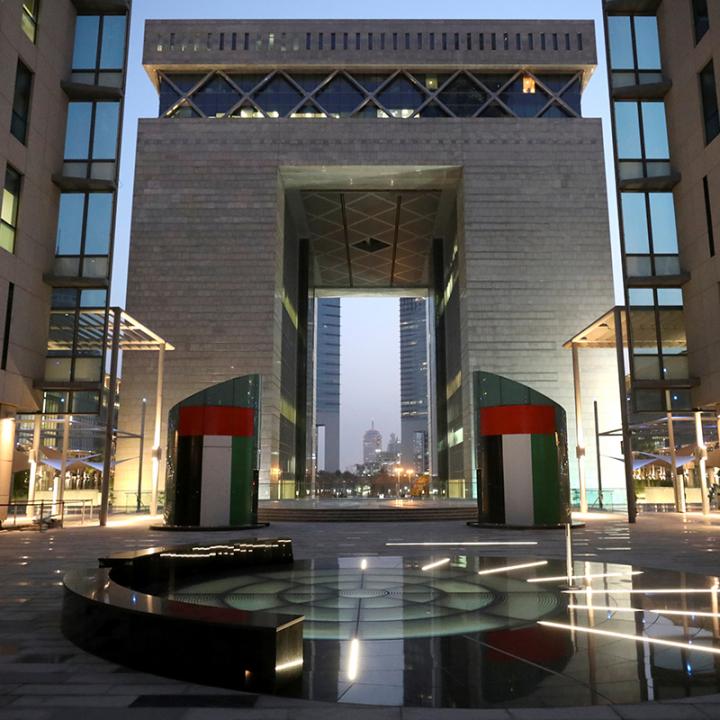
- Policy Analysis
- Fikra Forum
The UAE Formally Ceases to be a Tax-Free Haven

The United Arab Emirates (UAE) recently announced a 9% corporate tax on businesses set to begin in June 2023. The corporate tax is the latest alteration to the country’s former lack of taxation, after having first introduced a 5% value added tax (VAT) in 2018.
In Gulf Cooperation Council (GCC) countries, much of the post-oil regime stability of the past several decades was solidified by a rentier state mechanism that guaranteed a cradle-to-grave welfare state in return for citizens’ loyalty and acquiescence.
In particular, Dubai’s open, tax-free business model, which dates back to 1905, contributed to the success of the city—and the UAE as a whole. Dubai was also a regional pioneer in establishing Free Zones that guarantee 100 percent private ownership in addition to repatriation of capital and profit. According to the latest announcement on the tax code change, companies registered with these Free Zones remain tax exempt but are subject to certain requirements, which remain unspecified.
Fiscal Sustainability Remains Elusive
However, the new taxes demonstrate governmental concerns over the endurance of the strategy that has characterized the success of the GCC. Gulf states have hoped to shift away from a reliance on oil since gaining independence, and have released “Vision” documents identifying targets and specific strategies to wean economies away from hydrocarbon revenues. Additionally, the IMF has long impressed upon Gulf states the need to introduce a VAT to effectively transition to a post-oil economy. The urgency surrounding this issue was made clear by the fallout from the oil price plunge in 2014. Ever since, the UAE and other GCC states have been battling fiscal deficits, now worsened by the ongoing pandemic.
In June 2016, all GCC member states signed a unified agreement for imposing VAT taxes. Saudi Arabia and the UAE became the first Gulf countries to introduce the consumer tax in 2018 with a symbolic rate of 5%, while Bahrain and Oman followed in 2019 and 2021 respectively. Even while retaining the 5% rate, the UAE has generated around $26 billion in revenues so far. Evidently, the VAT has become the least risky go-to mechanism for Gulf monarchies to boost state coffers. In July 2020, Saudi Arabia tripled the VAT to 15%, while Bahrain’s increase of the VAT to 10% became effective on January 1, 2022.
Will the UAE Still Guarantee a Competitive Edge?
In July 2021, 130 countries agreed to implement or increase a corporate tax to at least 15% after negotiations held at the Organization for Economic Cooperation and Development (OECD), and suggested that this increase would generate around $150 billion annually. The rationale for this mass-coordinated increase was to also push multinational enterprises (MNEs) to pay their fair share of tax. The UAE was among the signatories of the deal, a decision that was partly a result of international pressure as well as a desire to cut spending and expand income sources. Moreover, the UAE believes that the new 9% tax rate scheduled to be implemented in 2023—still lower than the OECD agreement—will not affect the investment significantly. The rate will allow the country to maintain its competitive edge vis-a-vis neighboring Gulf states and other countries that generate investment from low taxes, such as Ireland (12.5%), Singapore (17%), and Hong Kong (between 8.5% to 16.5%).
Within the GCC, the UAE and Bahrain are the only two states that have not yet implemented a corporate tax. Moreover, the UAE’s new proposed corporate tax rate remains the lowest of any Gulf country. Saudi Arabia’s is the highest at 20%, while Oman and Kuwait levy the tax at around 15%—though the latter still does not apply the tax to Kuwaiti and GCC citizens. Qatar's corporate tax is close to that of the UAE at 10% percent. Tarek Fadlallah, a leading financial expert on the Middle East, explained that while it’s still early, 2023 is “shaping up to be challenging,” as companies may cut spending to offset payments caused by the impending higher taxes.
The Need for Balance and Transparency
In a December 2020 seminar about future policy outlooks and challenges for Gulf states, Joseph Sfakianakis, a senior scholar at Pembroke College in University of Cambridge, remarked that during economic crises, extracting more from the economy is not an ideal way forward. He cited the example of Ireland and Portugal, who were pushed to hike taxes in response to financial crashes but failed to see these changes yield the desired results. Sfakianakis suggested that if the Gulf countries do decide to push for more taxes to diversify non-oil revenues, they also need to ensure they are simultaneously inserting cash back into the economy.
More recently, Bahraini economist Omar Ubaydli said that states can mitigate the effects of the tax hikes through active public engagement and transparency. The UAE should follow this recommendation, given the country’s increasingly constricted space for public debate and its federal character, which obfuscates lines of communication. As there are still fourteen months in the run up to the implementation, the Ministry of Finance should organize workshops and seminars for educating businesses on the new tax regime, that will also help allay fears and anxieties of small and mid-size enterprises (SMEs).
Notably, the decision to normalize taxes in the Gulf only underscores the fact that democracy is not about the ballot box alone. For all the benefits that GCC states were able to accrue through a CEO and technocratic style of governance, in times of crises, principles of transparency and accountability clearly matter the most.


